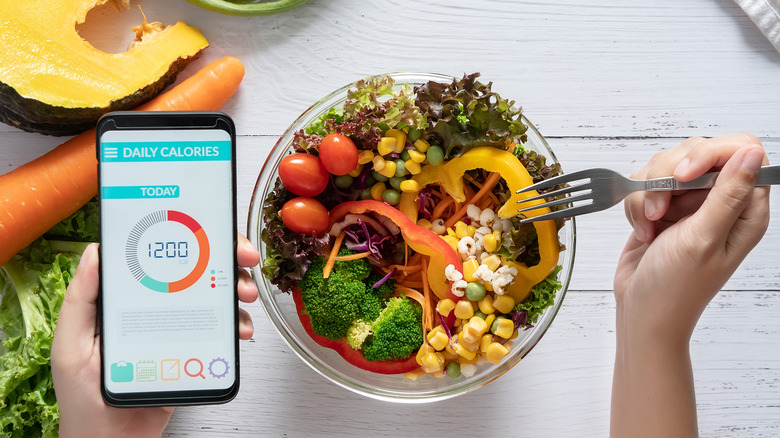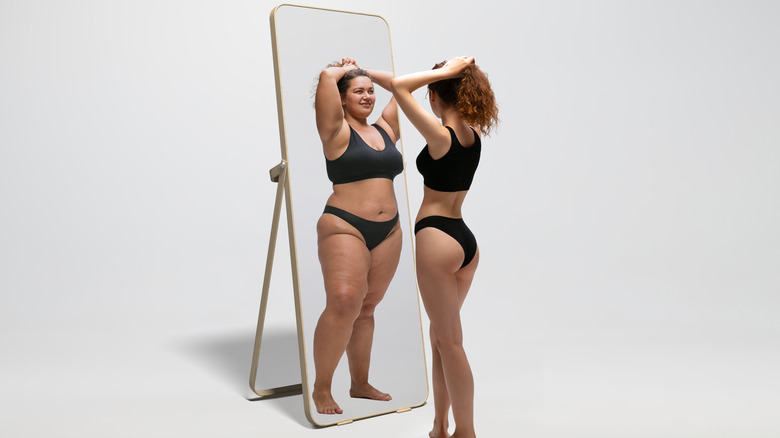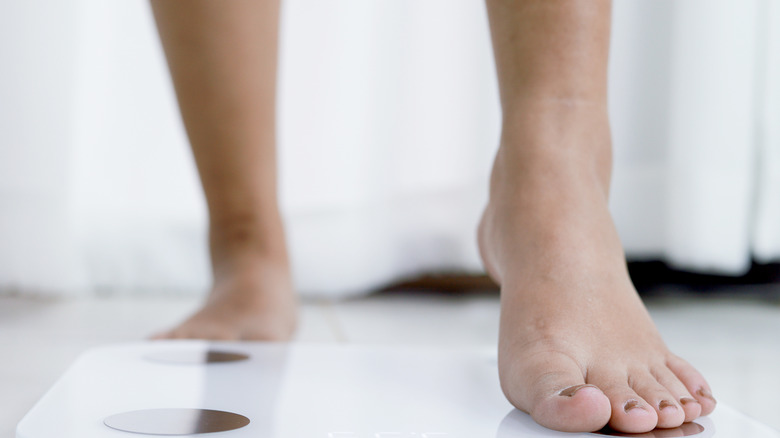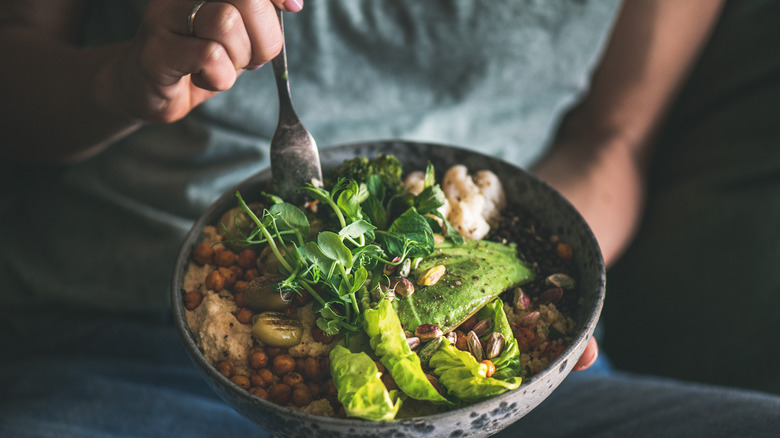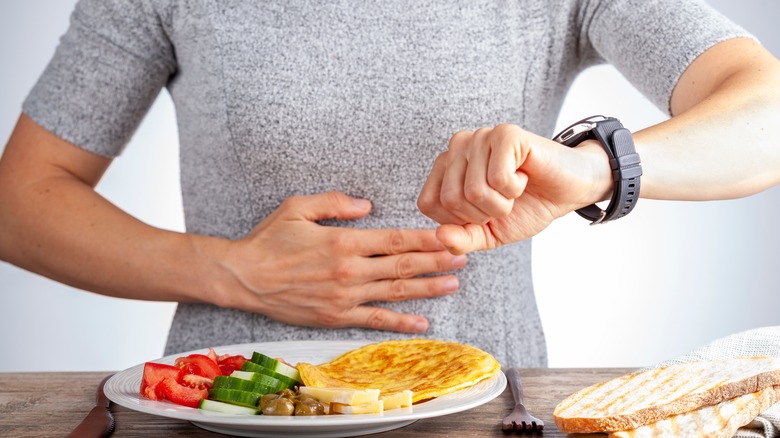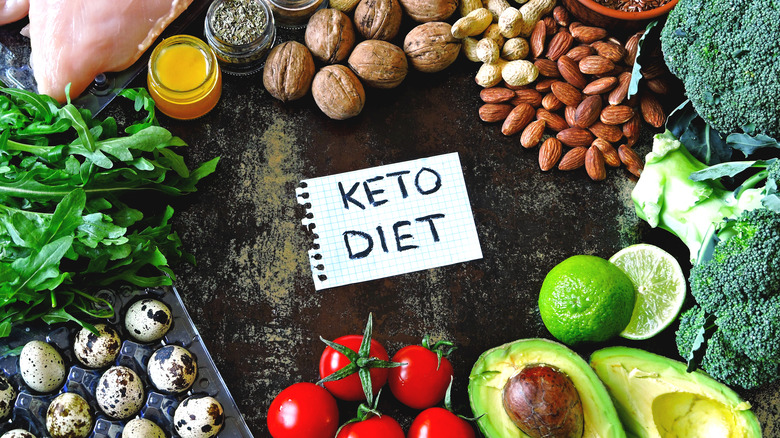Things Everyone Gets Wrong About Weight Loss
We may receive a commission on purchases made from links.
Fifty-three percent of Americans want to lose weight according to a 2016 Gallup poll. While that number is down from the previous decade, it's still over half of the population, which is a significant number. And there's no small amount of resources available for potential dieters; in fact, Americans spend $20 billion on weight loss products every year, and 85% of those consumers are women.
With such a huge market, it's important to be careful with how you approach weight loss should you decide to actively pursue it. There are potentially dangerous options out there, so being vigilant is of paramount importance. There's a lot of advice out there, and not all of it is good. Here are some of the things that everyone gets wrong about weight loss.
Wrong: You can flush the fat
Body cleanses or so-called detoxes are widely advertised and available at grocery stores and health food shops. But are these effective? Christen Cupples Cooper, Ed.D., RDN, director of Nutrition Programs at Pace University in Pleasantville, New York, told The List that they aren't, and can actually be bad for you. "There are many remedies for 'belly fat,' called anything from 'fat flushes' to 'body cleanses.' These products are usually costly and amount to nothing more than a glorified laxative."
She continued, "If you 'cleanse' your body of one of the heaviest substances in it — water — of course the scale will appear to register pounds lost." She told us that he often reminds people that the body has ways of detoxifying itself without help. "In fact," she said, "such cleanses can be harmful for some people. But in order to truly lose pounds in fat, it is necessary to take in fewer calories than the body burns. This is best done over time, cutting 250 to 500 calories a day and adding in exercise to assist with calorie burn."
Wrong: Ignore your hunger
People often assume that in order to lose weight, you'll have to go hungry. But Registered Dietitian Kelly Puryear, MA, RDN/LDN, CSCS, told The List this is a common mistake: "Oftentimes dieters will avoid eating when they are physically hungry because they are trying to limit their calories or they will eat when they are not hungry because the diet they are on mandates that they 'eat every two-to-three hours." And that's not an effective strategy.
She explained that "the issue with ignoring your own hunger cues and not practicing intuitive eating is that you are trying to override your body's natural homeostasis and interfering with normal hormone regulation. When you interrupt normal hormone balance, you cause a vicious cycle of increased fat-storing hormones and inflammation and decreased metabolism. As you can see, this vicious cycle only further prevents weight loss and will leave you feeling very sluggish and frustrated with your weight loss efforts!"
So it's important to listen to your body and eat when you feel physically hungry. "When you do not eat enough calories in hopes to promote weight loss, your body actually goes into starvation mode and will do everything in its power to conserve energy," said Puryear. She further noted that the result of this is the deregulation of your body's natural processes, meaning you store more fat and burn less energy when you're starved, which in turn leads to weight gain. "This ultimately lowers your metabolism and promotes fat storage, further preventing weight loss," she noted.
Wrong: Count your calories
While it's widely believed that losing weight is as simple as burning more calories than you eat, this isn't always the case. ACSM Certified Exercise Physiologist and a Certified Intuitive Eating Counselor Gillian Hood, MS, ACSM, told The List that, "Each person absorbs and processes calories and specific nutrients differently. A 2015 study in Israel proved that not everyone will have a blood sugar crash when eating ice cream, and they looked at other factors in the body related to processing food. Some of us absorb and take in more of the calories in one given food than another person will." So according to Hood, it's important to keep your body's unique functions in mind, going beyond calorie counting.
There's a good reason wrought calorie counting won't work anyway: science. Certified health coach Holly Lowery told The List, "What most people don't know is that trying to control our cravings and calories usually creates weight gain rather than the desired weight loss. This is due to weight-cycling and is best explained by the Set-Point Theory; a theory explored by many peer-reviewed studies suggesting that when we restrict, overeat, restrict etc., over and over again, the weight point our body is naturally happiest and healthiest at increases."
This explains why the more you diet, the harder it seems to get. Lowery continued, "The problem is that this set-point is easy to increase, but very difficult to bring back down. We get stuck in the yo-yo diet cycle and then blame ourselves for not having enough 'willpower' and the cycle continues when we restrict ourselves again to make up for the weight gain." So all of this dieting makes it harder and harder to lose weight. And for Lowery, experts telling us that we're failing and should diet more is a problem as it's harming, not helping, our health (and weight!) to diet in the first place.
Wrong: Pharmaceuticals and supplements can help
Diet pills and supplements are ubiquitous, promising fast, easy results. But popping a pill is anything but the right way to approach weight loss. Dr. Svetlana Kogan, author of "Diet Slave No More," told The List, "In my opinion, mainstream medical clinics are getting it all wrong about weight loss — they assume that there is a malfunction on the cellular level, which needs to be fixed with the medication. So, there is a push to market pharmaceuticals, which either block the cravings by introducing the amphetamine substance into the brain or try to disrupt fat absorption or processing by the intestinal cells. Both approaches are outrageous. They assume that there is something intrinsically wrong with us that needs to be fixed."
Additionally, these pills promote the idea that something is wrong with women that we can't lose weight. Kogan continued, "From the 'alternative community' there is not much help either. Some are trying to sell their supplements and herbs, which are increasing your metabolism and follow the same faulty logic." And that faulty logic — that women are broken — isn't helping women in the least.
Wrong: Fat is the enemy
It might seem intuitive: eat less fat, burn more fat, lose weight. But it's not so simple. Eating fat can actually be an effective weight loss tool! Puryear told The List, "The fat-free diet was all the rage back in the day and so many people fell for the trick that reducing fat intake would reduce body fat and promote weight loss."
But the reality, according to Puryear, is that the opposite is true. "When we consume a diet high in healthy fats (think avocado, olive oil, nuts and salmon) our bodies efficiently metabolize and use this fat for fuel. Fat also promotes lipolysis (the breaking down of fat for energy) and has little-to-no effect on insulin, which actually promotes fat storage! In fact, fat is the only macronutrient that does not affect insulin and thus does not promote fat storage." So in short, Puryear is saying that to burn fat, you have to eat fat.
But be careful not to overdo it, though. Millie Shedorick, MS, RD, author of "The ON-a-DIET, OFF-a-DIET Syndrome," noted, "Although we do need some fats, preferably from animals, we generally get too much. I tell my patients, 'Fats make you fat' because they are extremely calorie dense — even healthy fats, such as olive oil, which people are pouring over everything." When you do the math, Shedorick said that the fat calories can add up.
"One quarter of a cup of olive oil is approximately 400 calories! That means half of a cup of olive oil is 800 calories, compared to half a cup of cooked pasta for 100 calories, half a cup of fruit for 50 calories, or half a cup of vegetables for only 25 calories. One level tablespoon of oil, butter, mayonnaise and most dressings contains 100 calories that is added to whatever you are eating. If you overeat only 100 calories more a day than you need, you gain 10 pounds a year." Suffice to say that it adds up, so be mindful with your fats.
Wrong: Bad feelings can fuel weight loss
Dieting because you hate your body and feel ugly is a bad place to find motivation to slim down. Instead, it's better to be motivated by the same positive feelings you have for the people and things you love. Psychologist Jacqueline Julien, Psy.D.,L.P., told The List, "Starting a weight loss program because you love yourself will pull you toward the weight loss. You take care of the things you love — significant other, children, pets. You don't want to work hard for something you dislike."
Instead of focusing on the negative, Julien said it's important to focus on the positive — self-hate won't do it. "When you continually tell yourself 'I hate you' or 'you are so fat' and the other negative messages, your mind picks up on it and doesn't want to cooperate. When you let yourself know that you are trying to lose weight because you love yourself and want to take care of your body, it is a much easier pill to swallow. And because it is positive oriented your brain says, OK, yes, I want to do this!" And you can!
Wrong: Losing weight fixes everything
Often it can seem like the extra weight we carry is the source of so much of our unhappiness, and that losing the weight will fix all of our problems. But often times, simply carrying extra pounds can be an indicator of deeper problems.
Marion Rodrigue, MS, LMHC, NCC, told The List, "We often see individuals who are under the impression if they simply lost weight, their life would dramatically improve in all areas. Unfortunately, this is not often the case. Although they are taking courageous steps toward health, other aspects of their life such as relationships, anxiety or depression, and self-acceptance need to be addressed directly. Weight loss is not a 'fix all' for other challenges." This can be tough to pinpoint in a culture that promotes and values dieting, but it's important to remember that weight loss in an of itself won't cure your woes.
Eating counselor Hood agrees. "The weight is only a symptom of another problem — whether that problem is due to a health condition, emotional issues, lifestyle issues — it's not about the fat on the body. Yet that's all anyone focuses on," she told us.
She continued, "And, of course, there's the belief that once it's gone, life will be great, all problems solved. This just feeds the diet-binge cycle and keeps those in it stuck. If you uncover what's making you unhappy, or what thoughts/beliefs that you're holding on to that are causing problems in your life, or whatever else the reason for the weight gain (and it's often yo-yo dieting), when you resolve that issue, it's likely that the weight will take care of itself." So it's important to dig deep and find out what's at play beneath the surface, and use the right tools to heal.
Wrong: You have to diet restrictively
When people want to lose weight, the first instinct is to go on a diet. But Registered Dietitian Madeline Basler, MS, RDN, CDN, informed The List that, "Diets don't work, as they are restrictive and lead to feeling deprived, and hence overeating. They also are not sustainable for long periods of time. Working with eating disorder patients reveals that their restriction leads to bingeing and losing the ability to tell if they are hungry or not."
Basler noted that it's important to distinguish between physical hunger and emotional hunger. How? Listen to your body. "Hunger cues such as a growling stomach, or low energy is a physical sign of hunger, where as craving a particular food or what you are eating is not satisfying, are emotional signs. Watching a small child eat is how we intuitively eat. They eat when they are hungry and stop when they are satisfied. Getting back to that is the key to staying at a weight that is meant for you to be healthy and feel comfortable."
Wrong: Genetics aren't on your side
Is it possible that genetics are preventing us from slimming down? Dietitian Basler said it isn't, though it's understandable that there is confusion around this topic. She explained that there have been studies estimating a genetic component to obesity. Specifically, the FTO gene, she explained, has been associated with a higher BMI.
Basler noted it's not clear exactly what impact genetics have on weight. But, "the good news is that a study led by John Mathers at Newcastle University in September 2016, showed that the FTO gene didn't have much impact when it came to weight loss. A group of nearly 9,000 people were enrolled in 11 studies in which they agreed to genetic analysis. They were randomly assigned to a variety of weight loss methods, including diet, or drug-based therapies. Mathers found there was no difference in the amount of weight loss between those with the FTO gene and those without it." So it seems that genes aren't preventing us from dropping unwanted pounds after all.
Wrong: Thin equals healthy
Many experts will tell you that being overweight automatically means you are unhealthy, at risk for a host of problems like diabetes, high blood pressure, and heart disease. However, being heavy doesn't mean you aren't in good shape overall. In fact, it could potentially be better for you than the alternative. Eating counselor Hood noted that, "It's been proven that you can be 'fat' and healthy. There are many women who are intentionally not losing weight because the whole process made them sick and miserable, and they couldn't live their lives, because they believed they didn't deserve to live fully until they lost the weight."
So opting out of diet culture is not only possible, but might be the best route for some people. Hood continued, "Now so many of them have awesome, full, interesting lives and most importantly, they are healthy. A side note here — you can also respect or even love your body no matter what the size. Acceptance is necessary before anything is going to change, at least permanently change."
Wrong: It's all about nutrition and exercise
Say you eat right, exercise regularly, and still aren't having results. Are you still doing something wrong? Probably not — it's likely that there's another big factor at play. Eating counselor Hood said, "The most important factor that makes it impossible to lose weight, or to keep it off once lost, is not nutrition and it's not exercise. It comes down to stress. When the body is under constant stress, it acts as if it were under some type of threat. ... The body interprets dieting as a time of famine, and this alone puts the body under stress, because the 'stress response' is the fight or flight system."
Dieting itself can also make you stressed. Hood noted, "In fact, there was a study that showed counting and tracking calories increased the levels of cortisol in the body, which is an indication of the stress response having happened."
Why does the body react like this? It's part of our biology. Hood continued, "The stress response was quite helpful thousands of years ago when men and women had to hunt for dinner. Faced with a saber-toothed cat, the options were to fight or run away. The stress response is great for this -– among other functions, adrenaline is released and allowed for the quick burst of energy needed. This energy comes from stored glycogen in the muscles and liver. It's broken down into glucose and sent through the blood to the working muscles. Once the threat is over, cortisol is released to stimulate appetite, specifically for carbohydrate, so the glycogen stores can be filled back up."
How does this play our for modern women, then? "These days, we don't run or fight –- we're lucky to get exercise. Our stress doesn't last four minutes, it is chronic. One of the problems with this is when we are under stress, we crave carbohydrate (sugar, sweets, etc.). Dieters are already stressed, and this cortisol release causes them to crave and then eat carbs and instead of realizing it's due to stress, they believe it's due to a lack of willpower and not working hard enough on their diets. This, in turn, causes more stress and it continues." So it's important to be aware of stress levels lest you fall into the stress trap.
Wrong: You should keep an eye on the scale
Perhaps one of the worst myths surrounding weight loss has to do with the scale — if the number isn't going down, you're not making progress, right? Wrong, and that's not just our opinion. As noted by Verywell Fit, the scale can be one of the biggest hurdles in your weight loss journey for a number of reasons, both physical and psychological.
Let's start with the physical aspects of relying too much on the scale. The Joint Chiropractic has pointed out, first and foremost, that body weight fluctuates for various reasons. Perhaps you're more hydrated than normal; maybe you're menstruating. Possibly your hormones are interfering — there's a variety of reasons, simply not tied to food and exercise — that can impact the scale. Now let's talk about the psychological effects of the scale. Verywell Fit pointed out that when you're so focused on the number in front of you, the scale can take on a life of its own, causing mental fatigue and disappointment in your progress.
If you're still not convinced, we should talk about body composition. Verywell Fit further pointed out that the scale does not consider your body's changing properties — i.e., fat turning into muscle. So while your body may be gaining lean muscle in exchange for fat, the scale simply won't reflect that. So don't put all the emphasis on that measly little surface — after all, it's just a number.
Wrong: You should only eat low-fat foods
Raise your hand if you've had products labeled "low-fat," "calorie smart," and "light" metaphorically shoved down your throat since you were a kid. Chances are the majority of us have seen these specifically labeled products a litany of times, and in your quest to lose weight, you might be attracted to said food items once again. We're here to tell you that you should avoid low-fat foods, and we brought some science to back us up.
In a study conducted by Harvard's T.H. Chan School of Public Health, researchers found that out of 68,128 studied participants, "Low-fat diets were actually less effective than higher-fat eating strategies at helping people lose weight and keep it off for a year or more." Yes, sticking to low-fat foods had an adverse impact, and the study's lead author weighed in on the findings.
"As a nation, we've been following low-fat advice for years, but as a nation, we are also becoming more and more obese," Deirdre Tobias explained, per U.S. News & World Report. "It's clear that the low-fat approach isn't working."
WebMD further explained that sticking to a low-fat or low-calorie diet could easily push people down a path of overcompensation, as sticking to said foods could backfire. So instead of getting the low-fat Greek yogurt at the grocery store, consider just sticking to the normal stuff.
Wrong: Eating a lot of fruit will help you lose weight
When we think of the catchphrases and tropes often associated with losing weight, the old classic, "Eat your fruits and veggies," circulates. Of course, it's always good to incorporate whole foods and vegetables, but don't think that increasing your fruit intake — while decreasing your consumption of other products — will help with weight loss. Dr. Brenda M. Davy of Virginia Tech's Laboratory for Eating Behaviors and Weight Management explained to Everyday Health that fruit contains fructose. While that natural sugar has benefits, it should be consumed in moderation as it can have "unique adverse effects" on the body if overindulged. What are some consequences, you might ask? Digestion issues, bloating, and even weight gain.
Furthermore, a study released by The American Journal of Clinical Nutrition found that increasing fruit intake does not naturally help you slim down. If anything, your fruit intake should simply be incorporated into your normal diet, not made the central focus.
"There is currently a lack of empirical evidence that supports claims of a causal effect of [fruit and vegetable] intake on body weight," the study's conclusion reported. "Studies to date that have tested increased [fruit and vegetable] intake in isolation from other interventions indicated no significant effects on body weight."
So there you have it: Consume your fruit in moderation.
Wrong: You need to go gluten-free
We've all heard of the gluten-free lifestyle, and to say that the fad took hold of diet culture is an understatement. In 2013, about 27% of people in the United States genuinely thought that cutting all gluten out of their lives would help them lose weight, as reported by Prevention. We hate to break the weight loss bubble, but that logic doesn't necessarily pan out.
"There is a desire among Americans to search for some sort of magic bullet that's going to solve a lot of their health problems," Dr. Glenn Gaesser, who studied gluten and its impact on weight loss at the Healthy Lifestyles Research Center at Arizona State University, told Prevention. "But we couldn't find a single study published that supports a weight loss claim for a gluten-free diet."
Of course, some people have to cut gluten out of their diet due to celiac disease, but as noted by ABC News, the condition only applies to about 1% of the United States' population.
Wrong: You're choosing smoothies over meals
Smoothies and juice fads seem as old as diet culture because what better way to drop weight than by ditching food altogether, right? Wrong! We don't want to sound aggressive, but you need to eat. If you don't believe us, here's some science. The 21-Day Smoothie Diet, which catapulted the trend into the ether, was created by Drew Sgoutas (via Verywell Fit). The health coach implemented the plan, motivating followers to ditch food for three weeks straight. Of course, many of them lost weight, but the smoothie diet comes with a catch: longevity. Simply put, you cannot replace meals with smoothies forever, and Verywell Fit has pointed out that followers of the 21-Day Smoothie Diet had difficulty keeping off the pounds once they went back to regular eating.
The result of a fad like the 21-Day Smoothie Diet? Something that is called the yo-yo diet effect (via WebMD), where the body's weight fluctuates regularly.
Wrong: You're not satisfying your cravings
So many of us know what it's like to be at a birthday party or work event, where cheese boards, cupcakes, and crackers abound, only to take a soggy celery stick and dip it in ranch dressing, and unenthusiastically eat it. Then, a couple of hours later, you dream of those cupcakes, so you run to the grocery store, buy a dozen, and eat as many as possible. This is an unhealthy cycle, but so many of us have fallen victim to the diet message that cutting out all food that could be considered unhealthy is the way to go.
In your quest to drop some weight, might we suggest the following: Don't cut out the food that gives you joy — simply enjoy it in moderation.
A 2012 study from Appetite found that out of 129 women, those sticking to a strict diet with the sole purpose of losing weight found themselves craving far more than women who weren't being so regimented. So if you want to live a healthy lifestyle — physically, mentally, emotionally, and psychologically — you might want to consider allowing yourself that cupcake at the office party.
Wrong: Intermittent fasting is the solution
So the blender is in the cabinet, the scale is back under the bathroom sink, and we're saying yes to occasional craved foods, right? But what about intermittent fasting as a weight-loss solution? We have a resounding answer for you: Not today.
Intermittent fasting, when it first busted onto the diet scene, sounded like a great weight-loss hack to many people. However, a recent report from The New York Times indicated that the truth about intermittent fasting was turned on its head, with researchers confirming that there is no evidence to suggest that intermittent fasting is a beneficial way of losing weight. In a study conducted over the course of a year, those observed were asked to stick to a low-calorie diet, and they were only able to eat between 8 a.m. and 4 p.m. — but did they lose weight? Not as a result of fasting, it turns out.
"There is no benefit to eating in a narrow window," Dr. Ethan Weiss, a researcher on diet, explained according to the outlet. "Almost every type of diet out there works for some people. But the take-home supported by this new research is that when subjected to a properly designed and conducted study — scientific investigation — it is not any more helpful than simply reducing daily calorie intake for weight loss and health factors."
Wrong: Fad diets like keto or Whole30 are the answers
We know what you're thinking — we've busted weighing yourself, fasting diets, smoothie diets, and so what's left? What about the keto diet, Whole30, or other trendy eating plans with testimonials praising said methods? Well, we hate to break it to you, but each diet trend has drawbacks — if you want to lose weight and do it healthily.
As noted by the Mayo Clinic, the keto diet may not be all that it seems. There is "very little evidence to show that this type of eating is effective — or safe — over the long term," health experts have insisted. In fact, sticking to the ketogenic diet can result in adverse side effects such as headaches, bad breath, constipation, and micronutrient deficiency. As for Whole30, researchers at the Mayo Clinic have said that there is no scientific proof that it aids in weight loss.
Where does that leave you if you want to lose some extra pounds? With all the research and diet myths circling us regularly, the best tactic we can suggest is to listen to your body. The body is incredibly intuitive, so pay attention to what it needs and make choices that leave you feeling cared for.




